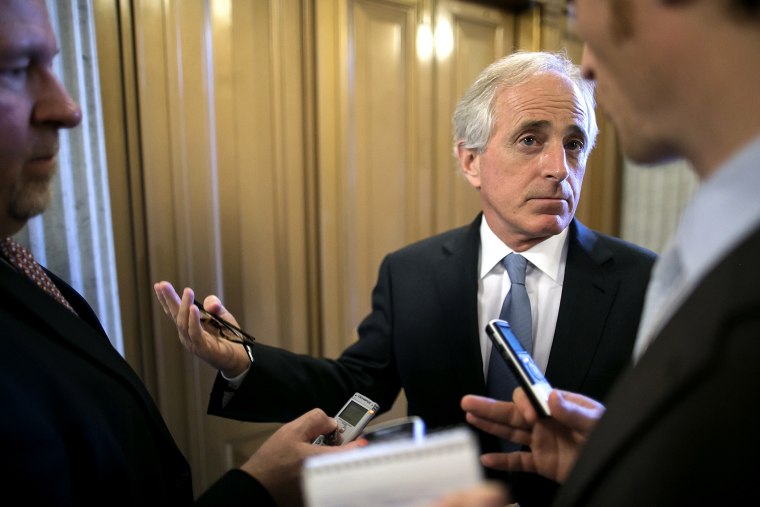In 12 days, the Republican National Convention will get underway, and before the festivities begin, we'll probably know who Donald Trump has chosen as his running mate. Between now and then, all the presumptive GOP has to do is choose a partner -- and hope he or she is amenable.
That last part may be easier said than done. A variety of prominent Republicans have already said they're simply not interested, including Sen. Rob Portman (R-Ohio), South Carolina Gov. Nikki Haley (R), Ohio Gov. John Kasich (R), New Mexico Gov. Susana Martinez (R), and Sen. Marco Rubio (R-Fla.). Today, as the Washington Post reported, the list got a little longer.
Sen. Bob Corker (R-Tenn.), the chairman of the powerful Senate Foreign Relations Committee who has recently emerged as a finalist in the search for Donald Trump's running mate, told The Washington Post in an interview Wednesday that he has taken himself out of consideration for the position. Corker said that he informed the presumptive Republican presidential nominee of his decision during their day together on Tuesday, when the senator had a series of meetings with campaign officials in New York and then flew with Trump to an evening rally in North Carolina.
This doesn't come as too big of a surprise -- if you saw Corker and Trump together yesterday, you know the two didn't seem especially comfortable around each other -- but the senator did fit the mold for the kind of person Trump is reportedly looking for. Indeed, given Corker's lengthy career in government, quiet demeanor, and interest in foreign policy, the senator brings qualities to the table that Trump desperately needs.
But in the end, Corker didn't want the gig. Neither, evidently, does Sen. Joni Ernst (R-Iowa), who's been under consideration despite only one year on Capitol Hill, but who told Politico she's already conveyed to Trump that she's focused on her Senate duties. "I think that President Trump will need some great assistance in the United States Senate and I can provide that," she added.
Under normal circumstances, we'd expect to see senators and governors quietly scrambling, hoping for VP consideration, but these aren't normal circumstances. Republicans hoping for a long and successful career are understandably concerned about being associated with Trump and his many, shall we say, issues.
Ordinarily, running on a national ticket, even an unsuccessful one, improves a politician's stature and national credibility, but it's hard to blame these GOP officials for keeping Trump at arm's length. He carries with him a political toxicity that infects those around him. Would-be running mates have to be responsible when weighing the impact such an association would have on their careers.
So who's left? A friend asked me the other day who'll get the Republican nod, if I had to guess, and I'll tell you what I told him: I have no idea. Part of the problem is that Trump is so erratic and irrational, it's hard to fathom what kind of criteria he'll use to evaluate possible vice presidents in the first place.
I saw someone note the other day, for example, that Trump believes short last names convey "power" better than longer last names. I have no idea if that was a joke, if Trump actually believes that, or both. He's an unpredictable sort of candidate, and not necessarily in a good way.
That said, as best as I can tell, the short list probably includes former Speaker Newt Gingrich, Gov. Chris Christie, Gov. Mike Pence, Sen. Jeff Sessions, Sen. John Thune, Sen. Tim Scott, former Sen. Scott Brown, and my personal dark horse, Oklahoma Gov. Mary Fallin.
Or maybe it'll be someone else entirely. There's nothing normal about Trump's candidacy, so there's no reason to expect his running-mate search to play by anything resembling traditional rules.
